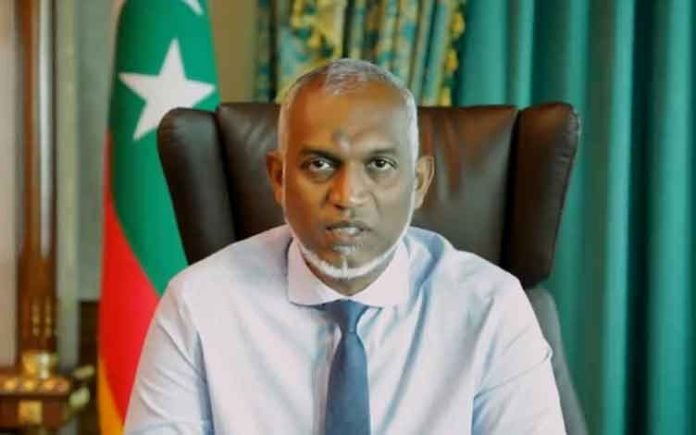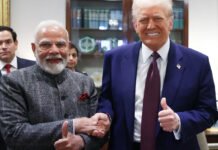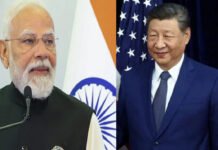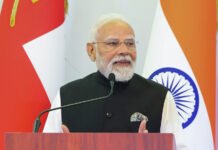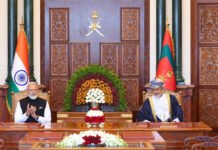“After ten months of leaning towards China, Maldives President Mohammad Muizzu has shifted back to India’s camp. This article explores the complexities of Maldives’ foreign policy, the ‘India Out’ campaign, and what lies ahead for this island nation.”
President Muizzu shift his stance from China to India
In the ever-shifting sands of international relations, few stories are as intriguing as that of Maldives President Mohammad Muizzu. After ten months of what can only be described as swinging in China’s lap, Muizzu has surprised many by pivoting back to India’s camp. For a man who rose to power on the back of the ‘India Out’ campaign, this about-face is as fascinating as it is puzzling. But what’s really going on? Has Muizzu had a genuine change of heart, or is this just another political maneuver? And where does this leave the Maldives in the complex geopolitical chess game being played out between the world’s two most populous nations?
Let’s dive into the tangled web of Maldives’ foreign policy, the implications of Muizzu’s U-turn, and what it all means for the future of this strategically located island nation.
The Rise of Mohammad Muizzu: A Brief Recap
The ‘India Out’ Campaign: From Opposition to Power
It wasn’t too long ago that Mohammad Muizzu was a name synonymous with the ‘India Out’ campaign. The movement, which called for the removal of Indian military personnel from the Maldives, resonated with a significant segment of the population. Muizzu’s message was clear: The Maldives must maintain its sovereignty and avoid undue influence from any foreign power, particularly India.
The campaign gained traction, and before long, Muizzu was propelled into the presidency. His victory was seen as a rejection of India’s growing presence in the Maldives and a nod towards closer ties with China, which has been steadily increasing its influence in the Indian Ocean region through infrastructure projects and investments.
Ten Months in China’s Lap: A New Foreign Policy Direction
After his election, Muizzu’s government quickly moved to strengthen ties with China. The Maldives became an enthusiastic participant in China’s Belt and Road Initiative (BRI), with several major infrastructure projects being launched. The Maldivian government also downplayed concerns about Chinese debt, insisting that these investments were crucial for the nation’s development.
However, this pivot towards China was not without controversy. Critics argued that Muizzu was putting the Maldives at risk of falling into a debt trap and losing its sovereignty to Chinese interests. Meanwhile, India watched with concern as its traditional sphere of influence seemed to be slipping away.
The Unexpected Shift: Back to India’s Camp
A Change of Heart or Strategic Calculations?
Fast forward ten months, and the political winds seem to have shifted once again. President Muizzu, who once ran on a platform of distancing the Maldives from India, is now singing a different tune. In a recent interview, he stated unequivocally that he would not allow anything that goes against the foreign policy of the Maldivian government. He emphasized the need for peace, development, and security, and made it clear that his government’s policy is to work together with all countries – a stark contrast to the ‘India Out’ rhetoric that helped him ascend to power.
So, what prompted this dramatic U-turn? Some speculate that Muizzu has realized the limits of relying too heavily on China, especially given the growing concerns about debt sustainability and the potential for a backlash from the Maldivian public. Others suggest that Muizzu is playing a more nuanced game, seeking to balance the interests of both China and India in order to maximize the benefits for the Maldives.
The Role of Domestic Politics
Domestic politics undoubtedly played a role in Muizzu’s shift. The ‘India Out’ campaign, which was initially a potent rallying cry, has lost some of its momentum. Former President Abdullah Yameen, one of the leaders of the movement, has announced that the campaign will continue, citing concerns about the presence of Indian military personnel in the Maldives. Yameen has been vocal in his criticism of Muizzu, accusing him of betraying the very principles that got him elected.
On the other hand, Muizzu’s opposition within his own party, the Maldivian Democratic Party (MDP), has taken a different stance. MDP president and former foreign minister Abdullah Shahid has gone on record saying that the ‘India Out’ campaign was created to deceive the people. He has demanded an apology from Muizzu for running the campaign in the first place.
With pressure mounting from both sides, Muizzu may have concluded that the best way to maintain his political standing is to adopt a more balanced and pragmatic foreign policy – one that keeps both China and India at arm’s length while ensuring that the Maldives does not become overly reliant on either.
The Broader Implications: What Does This Mean for the Maldives?
Balancing Act: Navigating Between China and India
The Maldives is not the first country to find itself caught between the competing interests of China and India, and it won’t be the last. Both nations view the Indian Ocean as a critical area of strategic importance, and the Maldives, with its prime location, has become a key battleground in this struggle for influence.
For the Maldives, the challenge is to navigate this delicate balancing act without alienating either side. Muizzu’s recent statements suggest that he is keenly aware of this, and is trying to strike a balance that will allow the Maldives to benefit from both Chinese investment and Indian security guarantees without becoming overly dependent on either.
Economic Realities: The Debt Dilemma
One of the most pressing issues facing the Maldives is its mounting debt, much of which is owed to China. Critics have warned that the country is at risk of falling into a debt trap, where it could be forced to cede control over key assets or infrastructure projects to Chinese interests if it is unable to meet its repayment obligations.
Muizzu’s renewed engagement with India could be seen as an attempt to mitigate this risk by diversifying the Maldives’ economic partners and reducing its dependence on Chinese loans. However, this is easier said than done. The Maldives still needs substantial investment in its infrastructure, and China remains one of the few countries willing to provide the necessary financing on favorable terms.
Security Concerns: The Military Presence Issue
The presence of foreign military personnel in the Maldives, particularly from India, remains a contentious issue. While the ‘India Out’ campaign may have lost some of its steam, the underlying concerns about sovereignty and security have not gone away. Former President Yameen’s insistence that the campaign will continue is a reminder that this issue is far from resolved.
Muizzu’s challenge will be to address these concerns without alienating India, which has traditionally been seen as the Maldives’ primary security partner. This could involve greater transparency about the nature and scope of Indian military activities in the Maldives, as well as assurances that the country’s sovereignty will not be compromised.

